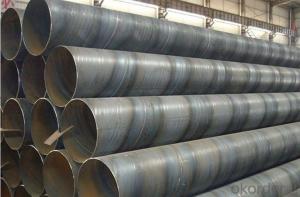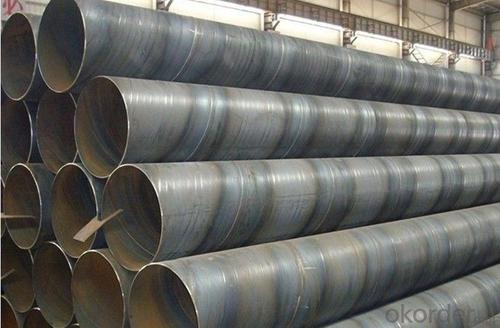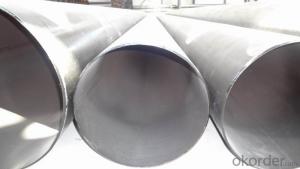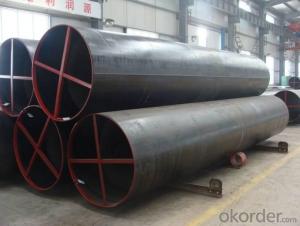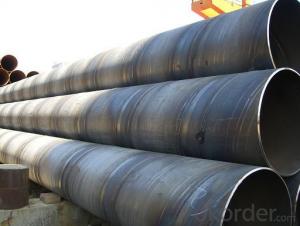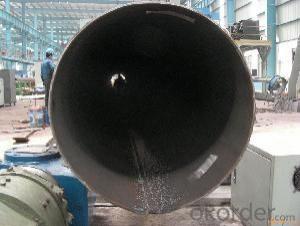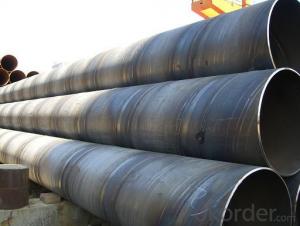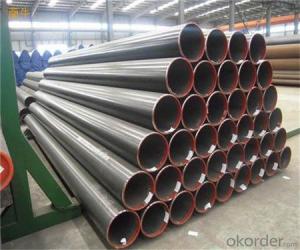API PSL1 LSAW STEEL PIPE
- Loading Port:
- China Main Port
- Payment Terms:
- TT OR LC
- Min Order Qty:
- -
- Supply Capability:
- -
OKorder Service Pledge
Quality Product, Order Online Tracking, Timely Delivery
OKorder Financial Service
Credit Rating, Credit Services, Credit Purchasing
You Might Also Like
OD:406.4 - 1422.4MM
WT:6.0-65 MM
Packaging & Delivery
| Packaging Detail: | standard packing suitable shipping by sea.oiled/ Varnish painting/FBE/2PP/2PE/3PE, bevelled ends with caps, marking as required.Plastic wrapped. shipped by air,train or sea pipes shipped by full containers, LCL or bulk cargo according to the contracts and customer requirements. 1M-5.85M shipped by 20' container,5.85m-12m shipped by 40' container. pipes with FBE/2PP/2PE/3PE coating will be shipped by bulk cargo, or open top containers. |
| Delivery Detail: | 7-35 days after advance paymen Standard:BS,ASTM,GB/T,API,EN t |
- Q: What are the different sizes of steel pipe nipples?
- Steel pipe nipples come in a variety of sizes, ranging from 1/8 inch to 6 inches in diameter.
- Q: Are steel pipes resistant to electromagnetic interference?
- Yes, steel pipes are generally resistant to electromagnetic interference due to their conductive properties. The metallic nature of steel helps to create a shielding effect, preventing the penetration of electromagnetic waves and reducing interference.
- Q: How do steel pipes handle water erosion?
- Steel pipes are highly resistant to water erosion due to their robust and durable nature. The smooth surface of steel pipes minimizes the formation of rust and corrosion, preventing water erosion from occurring. Additionally, steel pipes can withstand high water pressure and turbulent flow, further enhancing their ability to handle water erosion effectively.
- Q: How are steel pipes used in the construction of pipelines?
- Steel pipes are commonly used in the construction of pipelines due to their strength, durability, and resistance to corrosion. They are typically laid down and welded together to form a continuous pipeline that can transport various fluids, such as oil, gas, or water, over long distances. The steel pipes provide a reliable and efficient means of distribution, ensuring the safe and efficient transfer of resources in the construction industry.
- Q: How are steel pipes used in the manufacturing of furniture and appliances?
- Steel pipes are commonly used in the manufacturing of furniture and appliances due to their strength, durability, and versatility. One of the main uses of steel pipes in furniture manufacturing is for constructing the frames or structures of various pieces, such as chairs, tables, and beds. These pipes are often used as the primary support system, providing a sturdy and reliable foundation for the furniture. In appliances, steel pipes are utilized for various purposes. They are commonly employed in the manufacturing of kitchen appliances, such as stoves, ovens, and refrigerators, to create the internal framework and support the weight of the appliance. Steel pipes are also frequently used in the production of washing machines, dryers, and dishwashers to transport water and other fluids throughout the appliance. Furthermore, steel pipes are utilized in the manufacturing of outdoor furniture and equipment, where weather resistance and durability are crucial. These pipes are often coated with protective materials to prevent rust and corrosion, ensuring the longevity of the furniture and appliances. Overall, steel pipes play a vital role in the manufacturing of furniture and appliances, providing the necessary strength and support required for these items. Their versatility allows for various applications, making them an essential component in the production process of these goods.
- Q: Is there a weld on the outer wall of seamless steel tube?
- Seamless steel pipe, not seamless steel pipe, seamless steel pipe, welded seam, how can it be called seamless pipe?. Tell you a method: measurement of wall thickness, multi test several points, if each point, that is because it is cold drawn pipe, seamless pipe, hot rolling, wall thickness may% by sample.
- Q: What are the different methods of pipe support for steel pipes?
- There are several methods of pipe support for steel pipes, including clamps, hangers, brackets, and guides. Clamps are used to secure pipes to a structure, while hangers suspend the pipes from overhead supports. Brackets provide lateral support and stability, and guides are used to control pipe movement and prevent excessive sagging. These various methods ensure the proper installation and stability of steel pipes in different applications.
- Q: How do you join steel pipes together?
- There are several methods to join steel pipes together. The most common methods include welding, threading, and using mechanical connectors. Welding involves melting the ends of the pipes and fusing them together, creating a strong and permanent joint. Threading involves cutting threads into the ends of the pipes and using threaded fittings to connect them. Mechanical connectors, such as couplings or flanges, use fasteners or compression to hold the pipes together. The choice of joining method depends on the specific application and the type of steel pipes being used.
- Q: How are steel pipes used in the manufacturing of furniture?
- Steel pipes are often used in the manufacturing of furniture as structural components. They are commonly employed for creating sturdy frames for chairs, tables, and other items. The pipes provide strength and durability, allowing furniture to withstand heavy loads and daily use. Additionally, steel pipes are often used for creating unique designs and modern aesthetics in furniture pieces.
- Q: How are steel pipes used in the food and beverage industry?
- Steel pipes are commonly used in the food and beverage industry for various applications such as transporting liquids and gases, including water, beverages, and food ingredients. They are chosen for their durability, resistance to corrosion, and ability to maintain hygiene standards. Steel pipes are used to facilitate the flow of materials throughout the production process, ensuring safe and efficient operations in the food and beverage industry.
Send your message to us
API PSL1 LSAW STEEL PIPE
- Loading Port:
- China Main Port
- Payment Terms:
- TT OR LC
- Min Order Qty:
- -
- Supply Capability:
- -
OKorder Service Pledge
Quality Product, Order Online Tracking, Timely Delivery
OKorder Financial Service
Credit Rating, Credit Services, Credit Purchasing
Similar products
Hot products
Hot Searches
Related keywords
